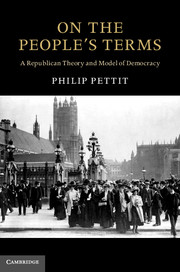Book contents
- Frontmatter
- Contents
- Tables
- Acknowledgements
- Introduction. The republic, old and new
- Chapter 1 Freedom as non-domination
- Chapter 2 Social justice
- Chapter 3 Political legitimacy
- Chapter 4 Democratic influence
- Chapter 5 Democratic control
- Conclusion. The argument, in summary
- References
- Name index
- Subject index
Introduction. The republic, old and new
Published online by Cambridge University Press: 05 January 2013
- Frontmatter
- Contents
- Tables
- Acknowledgements
- Introduction. The republic, old and new
- Chapter 1 Freedom as non-domination
- Chapter 2 Social justice
- Chapter 3 Political legitimacy
- Chapter 4 Democratic influence
- Chapter 5 Democratic control
- Conclusion. The argument, in summary
- References
- Name index
- Subject index
Summary
THE PROJECT
Every philosophy of the good society starts with an account of the canonical complaint that the state should help to put right: the evil that the society should drive out by means of political organization and initiative. The complaints targeted for political rectification come in two broad families. On the one side, personal afflictions like misery or poverty or inequality; on the other, social failures like division or disorder or perhaps an excess of customary restriction.
The more personal complaints generate a powerfully motivating agenda, since most of us would rejoice in a state that silenced them. But these complaints are liable to seem politically over-demanding. While it would be good to be rid of misery or poverty or inequality, not everyone will agree that the state could, or should, be given the job of dealing with them. The removal of the less personal evils is not politically over-demanding in the same way, for most people will think that the state is able to remedy such failures. But these complaints may fail to motivate appropriately: their rectification falls short of what many of us feel that we in a politically organized society can and should collectively provide for our members.
- Type
- Chapter
- Information
- On the People's TermsA Republican Theory and Model of Democracy, pp. 1 - 25Publisher: Cambridge University PressPrint publication year: 2012



